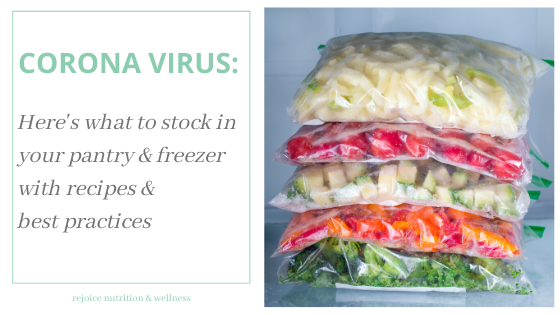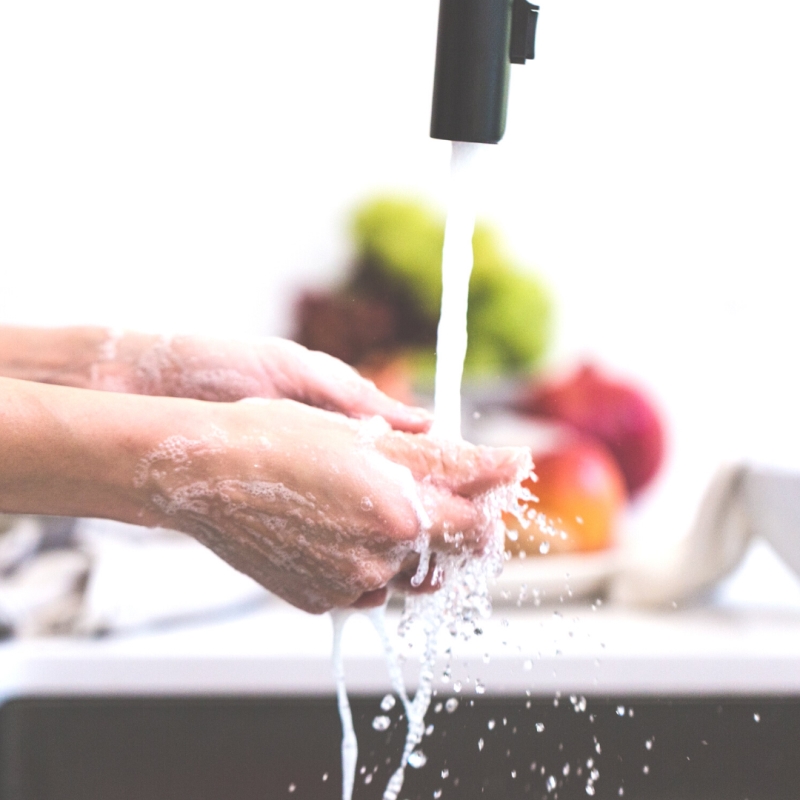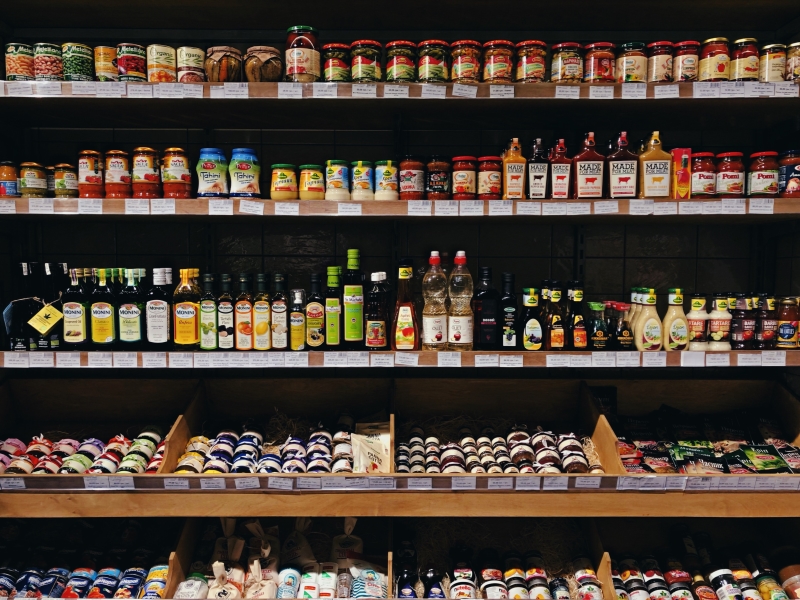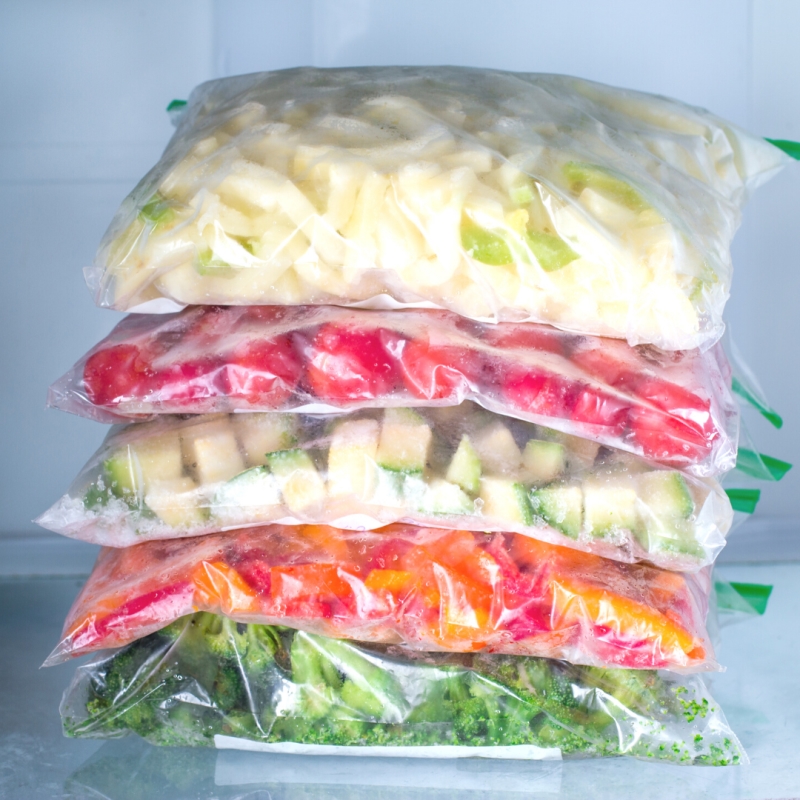Over the past few days, I have spent a great deal of time on the phone coaching my nutrition clients through their concerns and fears as it relates to the coronavirus. What do I buy? How can I stock up on the foods that will keep me and my family well? How do I get the nutrition I need to support my immune system from non-perishable goods? After about a dozen weekly coaching calls I thought it would be beneficial for others to have some tangible information that can help guide them while they shop.
First before I dive into the pantry and fridge basics I think it is important to acknowledge that you might feel overwhelmed, panicked, and scared. I understand why it feels like a scary time. The Coronavirus (COVID-19) on social media ranges from 100% dismissal of it and meme’s that poke fun to full on fear provoking articles that can make it feel like its Armageddon. The coronavirus is here, and we need to prepare for it.
There is a difference between over-preparing and panicking though, the best thing we can do for our health, our families, and our communities health is to implant best immune-boosting practices for resilience and vitality. Some of the basic include:
-
Wash our hands
-
Wipe down doorknobs, buttons, and railings in our home
-
Get lots of rest
- Do not touch your face with unwashed hands
-
Practice social distancing when and where possible.
-
Implement Stress Management practices. Balance staying informed and binging on the social media around the issue to manage your stress. Every person is different here, so tune-in and know your personal limits. If scrolling the news feed in bed causes severe anxiety and impacts your ability to sleep than you might want to shut it down an hour or two before bedtime and limit where you are getting your factual information from (World Health Organization and National News Channels).
-
Consume good sources of protein, healthy fats, fibre and nutrient dense foods
-
Keep Hydrated throughout the day.
-
Movement for Immune Health. Unlike our cardiovascular system that has its own pump (aka our heart), our lymphatic system (immune system) requires us to be the pump. So we need to move our body in gentle ways to support immune health. This can be stretching at home on a mat, walking up and down the stairs in your home, or watching a 15 minute yoga or exercise video on youtube or an app. move in whatever way works for you.
To stay healthy it is important to stock up on foods that are nutrient dense and deliver a nutritional punch to your immune system. Here’s what to add to your shopping list: 1. Fruits & Vegetables
1. Fruits & Vegetables
It’s a good idea to keep your freezer and pantry stocked with fruit and veggies. Frozen produce can have similar nutrients as fresh produce but they will last a lot longer. I like to pick unsweetened fruits, and unseasoned or no-added-sodium veggies. You’ll also want to load up on some hardier perishables, which you can eat before going for your longer-lasting stash. Here are some fruits and veggies to add to your shopping list.
- Longer-Lasting Fresh Fruits: Citrus fruits such as oranges, lemons, limes, grapefruits. Citrus fruits are packed with Vitamin C and are great in supporting our immune system. Bananas are great, I like to buy unripe bananas which will ripen over a few days and when they do turn black you can freeze them to add to your smoothies or add them to muffins or breads. Apples are also a great long-lasting fruit which when they get soft you can add them to your slow-cooker to make applesauce which is a great snack, can be used as a butter/oil substitute in baking, as well will keep frozen for 3 months.
- Frozen Fruit: Load up on dark antioxidant rich frozen berries, pineapple, mangoes, coconut, avocado’s, and stone fruits like peaches which are perfect for making breakfast smoothies, adding to a muffin mix, or topping your yogurt and oatmeal with. In addition to important fiber, frozen berries contain phytonutrients, which are important antioxidants that play a key role in gut and immune health.
- Dried Fruit: Shop for dried raisins, coconut meat, dates, mango, cranberries, figs, apricots, prunes, and whichever dried fruits you like. Just be mindful that dried fruit has a much higher sugar content so I like to add a little with nuts and seeds to make a quick energy-boosting trail mix.
- Long-Lasting Veggies: Hardy veggies like broccoli, bell peppers, cauliflower, carrots, potatoes, squash, garlic, and onions are great to stock up on for your pantry and fridge.
- Frozen Veggies: Pick you favourites! Try frozen spinach, broccoli, cauliflower, beans, riced cauliflower, butternut squash and beets. Stock up your freezer with these to make up most of your main meal plates. I also will take fresh lettuce (of any variety I have on hand) and blend it with water and pour it into ice cube trays. This way I have frozen green ice cubes I can toss into my smoothie. Frozen veggies are great to toss into easy weeknight slow cooker meals.
- Canned veggies: Canned pumpkin, canned tomatoes, olives, beets, artichokes, mushrooms are some of my favourite top picks. You can add antioxidant rich pumpkin to breads, energy balls, and cookies. Canned tomatoes are a staple as you can add them to chilli, make pasta sauce, and soups.
- Powdered Veggie Blends: This might not be the first thing you think of when stocking your pantry, however dried beet powder, Vitamin C powder blends like from Mega Foods which is cried citrus and cranberries, or dried high potency greens blends like Spirulina and chlorella can be added to yogurts, smoothies, at-home lattes, or water to deliver iron, protein, and chlorophyll that you might be missing from fresh greens.
2. Protein
It is important that you are getting enough Protein in your day as your immune system and respiratory tissues and cells rely on it. Protein deficiency can lead to you feeling fatigued and weekend your immune system. Here are some sources to consider for your freezer and pantry.
- Canned Beans: Select no-added-salt varieties. Stock up on chickpeas, black beans and lentils. Rinsing your beans under running water is always a good idea and if you find that canned beans cause gas soak them in a bowl of water for 4-6 hours before preparing. Beans with rice make a full protein, blend beans with garlic, oil, and seasoning for a dip with veggies, or add to soups and chilli.
- Canned Fish: Tuna, salmon and sardines are all great options. Our dietary guidelines call for two servings of seafood each week and canned fish is a convenient way to meet the mark. Try canned fish on top of salads or crackers, mixed with pasta, or get cooking and make fish cakes.
- Seeds & Nuts : Seeds, such as pumpkin seeds, hemp seeds chia seeds, and flax seeds supply some protein as well as fiber. Nuts, such as pecans, walnuts, macadamia and almonds can also be a great snack, add them to your breakfast cereals and oatmeal or use them to top salads or main dishes, or add with dried fruit to make a trail mix.
- Dried, Beans & Lentils: Bags of dry chickpeas, beans, lentils, peas, and edamame will store in your pantry for a year. You can soak them or add them with bone broth to make a nourishing soup or stew.
- Cheese: Some hard cheeses, like Cheddar or feta in water can last more than two weeks as long as you make sure to store them properly. You can also store shredded cheese in the freezer! You can also grab some dried cheese crisps (like “Whisps”) which store great in the pantry and can be used as crackers or croutons.
- Nut & Seed Butters: There are so many nut and seed butters now that are fantastic sources of protein, minerals and fibre. Peanut butter, almond butter, cashew butter, tahini, pumpkin seed butter, etc etc, These can be put on a piece of toast, added to your smoothie, added to baking, or used to make energy balls or hummus. These are great additions to your protein pantry and homemade nut butter is easy to do.
- Eggs: Store eggs in their carton on a fridge shelf (NOT the door), where they’ll last for about three weeks. Boiled eggs will stay good in their shell for a week. They’re a convenient way to get a protein fix.
- Milk & Non-Dairy Milk Options: Unflavoured, shelf-stable varieties sold in aseptic packaging are a great choice for emergency situations. You might want to load up on milk made for lunch boxes and there is powdered milk you can buy and add with water in an emergency. If you’re choosing plant-based options, pea and soy-based versions come close or match the protein content in dairy milk. Coconut milk and unsweetened nut milks have a little less protein but you can buy them in tetra packs that are shelf stable and are great for adding to smoothie or cereals.
- Animal Proteins: Ground meats like turkey, pork, chicken, bison and lean ground beef can be cost-effective and versatile proteins to store in the freezer. Large box of frozen chicken breasts, frozen shrimp, and any other meats your family likes stores well in the freezer.
- Bone Broth: Repurpose soft veggies and leftover bones or buy bones cheap from the grocer and make a simple bone broth. Bone Broth freezes well for 6 months, you can make soups with it for added protein or drink it alone as a meal replacement.
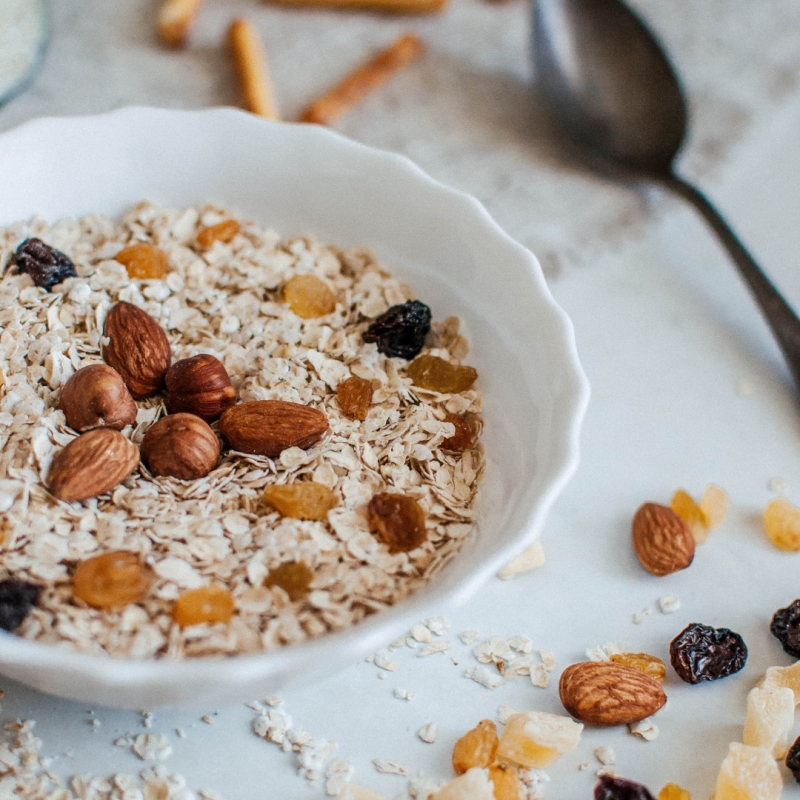
3. Grains & Non-Gluten Grain Alternatives
Grains like pastas, oats, rice, and breads provide fiber and other nutrients to keep you healthy during your at-home stay. Plus, some grains like chickpea and lentil pasta are great shelf-stable foods that pack way more protein and fiber than ordinary noodles. These foods can be kept in the pantry and breads can be stored easily in the freezer.
- Single ingredient grains: Shop for whole grains, such as steel cut oats, quinoa and brown rice. These make tasty and nutritious side dishes, and they’ll keep in your pantry. Quinoa is great as a gluten-free alternative and can be used as both savoury and sweet breakfast dishes. Like my Maple Quinoa Porridge, yum!
- Pasta: Select whole wheat grains pasta over white for more fiber and use chickpea and lentil pasta varieties for more protein. Add a can of tomato sauce and add some beans, canned tuna, frozen shrimp or sautéed ground meat for a full meal. Here is a simple pasta recipe here you can used frozen or canned veggies instead of fresh.
- Flours: Stock up on an assortment of flours, such as chickpea flour, almond flour, coconut, and whole-grain flour. Hey! why not bake if you’re staying home! These flours provide more nutrition than your standard white flour. Muffins, breads, no bake energy balls and snacks are a great way of turning all your pantry items into healthy, lower sugar snack alternatives for your family. I have tons of recipes on the blog.
- Breads: Frozen bread, wraps, and buns will last for months. Make sure to buy 100 percent whole grain varieties or gluten free versions as you need.
- Crackers: Whole grains, seedy crackers and even nut-based crackers are a great staple. Enjoy with cheese, dip into hummus or other dips, or top with canned tuna.
- Cereal: Whole grain, low-added sugar cereals are a great options. Whole Oats or quick oats are awesome!! Cause you can turn them into an easy one-pan granola or into overnight oats.
- Popcorn: Right? This one is easy to forget but this whole grain is loaded with antioxidants and fiber. You’ll appreciate having some of this on hand since you’ll no doubt have some extra time to watch Netflix. You can buy the kernels and pop them on your stove, or buy a high quality bag of popcorn like Boom Chicka Pop.
4. The Condiment Basics
Condiments and bottles can add up pretty fast at the checkout. I like to simplify this section into my favourite basics which are add flavour and cooking versatility with only a few items.
- Oil & Vinegar: You can pick your one of each or a have a few oils like coconut oil, avocado oil, extra virgin olive oil and vinegars such as white or red wine vinegar, balsamic, or apple cider vinegar. oil and vinegar can be used to make a variety of dressings, oil can be used as a butter replacement in baking, and both can be drizzled on a pan over to roast hardy veggies. These are two staples that are important to have on hand.
- Mustard and Mayonnaise. Again there are many varieties of both of these and some non-dairy options of mayo as well. Pick your favourite. These are great sandwich spreads, can be used to make a salad dressing, protein marinades, mixed in to make a yummy tuna salad.
- Seasonings: Salt, Pepper and your go to all-purpose seasoning (I love greek seasoning) is all you need. It does not have to be complicated. Keep it simple and use these in marinades, and dressings.
- Top 1-3 Family Must-Haves: These are unique to your home. You know them, maybe your family goes through a big jug of BBQ sauce (DIY BBQ sauce), your kids crush the ketchup bottle (home-made ketchup is easy), or you have a salad dressing must have you use for salads and proteins? Whatever they are pick your top 2-3 family condiment must haves and stick to those to keep things simple. Mine include a big jar of salsa as I love the versatility and a bottle of franks red hot sauce.
Let’s Chat
I understand that this time can feel scary. I hope that these best practice tips, pantry and freezer list with ideas of how to use the items and the linked recipes help to ease some of the worry and tension around how to stock up to support your families health. Social distancing can feel isolating. If you want to connect in a safe place, share recipe and wellness ideas, ask questions please join me in the Rejoice Community Hub on Facebook. A safe, open community that is sharing ideas and tips to stay health and well in a non-judgemental space.
You can also connect with me on Facebook or Instagram. I am also always sharing wellness tips, easy healthy recipes, and health info on the Rejoice social media channels to seamlessly fit healthy living into even the busiest of lifestyles. I look forward to connecting with you there!
Remember to Breath deeply. Take calm and safe precautions. Show love and empathy to those that need it. And Take care of you and your family.
In great health,
JO

